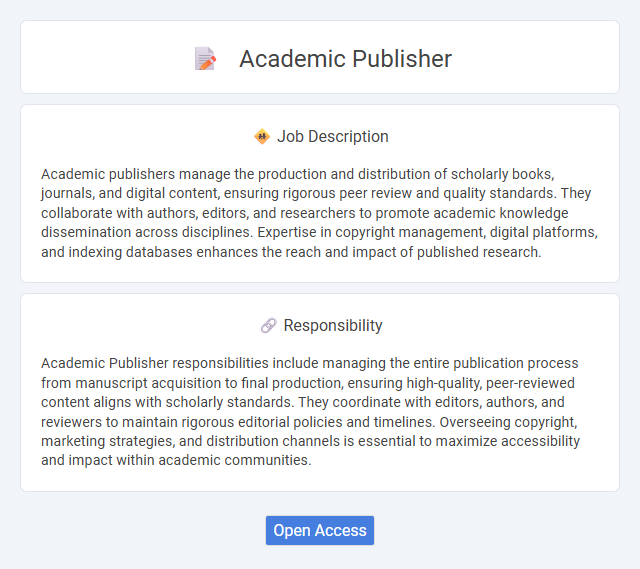
Academic publishers manage the production and distribution of scholarly books, journals, and digital content, ensuring rigorous peer review and quality standards. They collaborate with authors, editors, and researchers to promote academic knowledge dissemination across disciplines. Expertise in copyright management, digital platforms, and indexing databases enhances the reach and impact of published research.
Individuals with strong attention to detail and a passion for research may find Academic Publisher roles suitable, as the job often involves managing scholarly content and ensuring accuracy. Those who thrive in structured environments and can handle deadlines are likely to adapt well to the editorial and coordination aspects of the position. However, people who struggle with repetitive tasks or lack patience for meticulous review processes might find this career challenging.
Qualification
A successful academic publisher must possess a strong background in literature, research methodologies, and subject-specific knowledge to effectively evaluate manuscripts and collaborate with authors. Proficiency in editorial software, understanding of publication ethics, and excellent communication skills are essential for managing the peer review process and ensuring high-quality scholarly output. Advanced degrees in relevant fields, alongside experience in academic publishing or journal management, significantly enhance a candidate's qualifications.
Responsibility
Academic Publisher responsibilities include managing the entire publication process from manuscript acquisition to final production, ensuring high-quality, peer-reviewed content aligns with scholarly standards. They coordinate with editors, authors, and reviewers to maintain rigorous editorial policies and timelines. Overseeing copyright, marketing strategies, and distribution channels is essential to maximize accessibility and impact within academic communities.
Benefit
An academic publisher job likely offers the benefit of contributing to the dissemination of scholarly knowledge, enhancing access to critical research and educational resources. Employees may benefit from exposure to cutting-edge academic content, fostering professional growth and expertise in various disciplines. The role often provides opportunities for networking with researchers and institutions, potentially increasing career advancement prospects.
Challenge
Academic Publisher roles often involve navigating the challenge of balancing rigorous peer review processes with timely publication demands. The probability of encountering complex ethical considerations and ensuring content integrity is high, requiring meticulous attention. Adapting to evolving digital dissemination platforms may also present ongoing obstacles in maintaining competitive relevance.
Career Advancement
An Academic Publisher job offers significant career advancement opportunities through roles such as editorial management, production coordination, and digital publishing innovation. Professionals in this field gain expertise in scholarly communication, peer review processes, and open access models, enhancing their qualifications for senior positions like Publishing Director or Content Strategist. Mastery of emerging technologies and data analytics in academic publishing further accelerates upward mobility and leadership potential.
Key Terms
Open Access
Academic Publishers specializing in Open Access facilitate unrestricted online access to scholarly research, increasing visibility and citation potential. They manage rigorous peer-review processes, ensuring quality and integrity while supporting global knowledge dissemination without subscription barriers. Their role includes negotiating publication rights and promoting sustainable Open Access models to benefit researchers and institutions worldwide.
 kuljobs.com
kuljobs.com